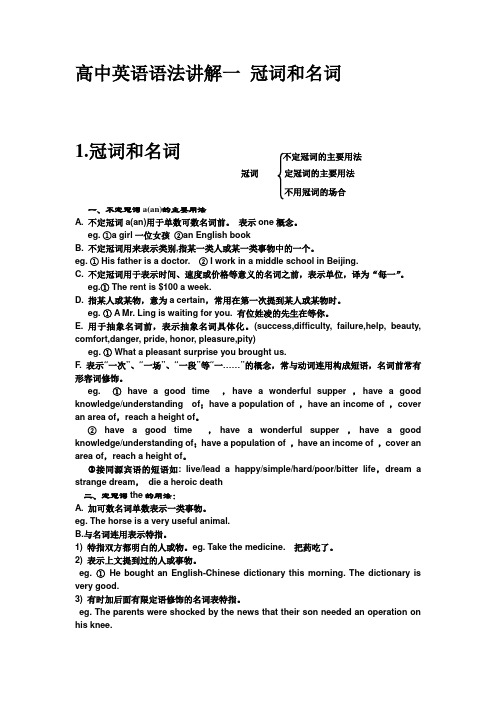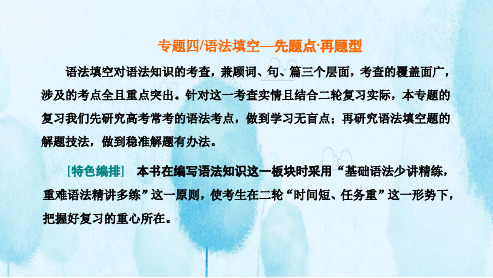第一讲 名词、冠词
- 格式:ppt
- 大小:2.10 MB
- 文档页数:73

第一讲英语词性大串讲英语词类分十种:名词、形容词、代词、数词、冠词、动词、副词、介词、连词、感叹词。
1、名词(n.):表示人、事物、地点或抽象概念的名称。
如:boy, morning, bag, ball, class, orange.2、代词(pron.):主要用来代替名词。
如:who, she, you, it .3、形容词(adj.):表示人或事物的性质或特征。
如:good, right, white, orange .4、数词(num.):表示数目或事物的顺序。
如:one, two, three, first, second, third, fourth.5、动词(v.):表示动作或状态。
如:am, is,are,have,see .6、副词(adv.):修饰动词、形容词或其他副词,说明时间、地点、程度等。
如:now, very, here, often, quietly, slowly.7、冠词(art.):用在名词前,帮助说明名词。
如:a, an, the.8、介词(prep.):表示它后面的名词或代词与其他句子成分的关系。
如in, on, from, above, behind.9、连词(conj.):用来连接词、短语或句子。
如and, but, before .10、感叹词(interj..)表示喜、怒、哀、乐等感情。
如:oh, well, hi, hello.一.名词I.名词的种类:以练促记:1. ( 2012天津,32) —Why didn’t Sally play the violin at the concert last night?—She said that her hand hurt, but that was only a(n)_________. I saw her play tennis just now.A. matterB. excuseC. resultD. expression2. (2012重庆,24) —Bill ,what’s your sister’s favorite__________? —She likes volleyball best.A. foodB. colorC. sportD. movie3. ( 2012黑龙江哈尔滨,21 ) Dear friends ,please read every sentence carefully. Details decide __________ or not. If you take it serious-ly, you’ll achieve your goal!A. successB. successfulC. succeed4. ( 2012辽宁沈阳,8 ) The__________in that restaurant looks delicious ,but it tastes bad.A. cookB. tableC. foodD. tool5. (2012江苏南京,3 ) —Could you tell me how to remember new words quickly?—Yes, I think a__________ tree can help you a lot.A. grammarB. equationC. punctuationD. vocabulary6. ( 2012四川成都,33) —Where did you go yesterday, Rick?—I went to see a__________ because I had a cold.A. teacherB. doctorC. reporter7. ( 2012湖北武汉,33)lf by any chance Peter comes to us, please ask him to leave a__________.A. letterB. sentenceC. messageD. notice8. ( 2012浙江温州,5) —Where does your uncle work, Jack?—In a__________ in Paris. He is a policeman.A. TV stationB. bookstoreC. post officeD. police station9. ( 2012江西,27) If you go to visit London, don’t forget your __________ because it rains a lot.A.passportB.moneyC.mapD.umbrella10. ( 2012湖北襄阳,26) —What does your father do ,Lily?—He is __________ . His job is to make sure that drivers obey the traffic rules.A. an actorB. a policemanC. a waiterD. a reporterII. 名词的数:1. 规则名词的复数形式:名词的复数形式,一般在单数形式后面加-s 或-es。





高中英语语法讲解一 冠词和名词1.冠词和名词一、不定冠词a(an)的主要用法A. 不定冠词a(an)用于单数可数名词前。
表示one 概念。
eg. ①a girl 一位女孩 ②an English bookB. 不定冠词用来表示类别,指某一类人或某一类事物中的一个。
eg. ① His father is a doctor. ② I work in a middle school in Beijing.C. 不定冠词用于表示时间、速度或价格等意义的名词之前,表示单位,译为“每一”。
eg.① The rent is $100 a week.D. 指某人或某物,意为a certain ,常用在第一次提到某人或某物时。
eg. ① A Mr. Ling is waiting for you. 有位姓凌的先生在等你。
E. 用于抽象名词前,表示抽象名词具体化。
(success,difficulty, failure,help, beauty, comfort,danger, pride, honor, pleasure,pity)eg. ① What a pleasant surprise you brought us. F. 表示“一次”、“一场”、“一段”等“一……”的概念,常与动词连用构成短语,名词前常有形容词修饰。
eg. ① have a good time ,have a wonderful supper ,have a good knowledge/understanding of ;have a population of ,have an income of ,cover an area of ,reach a height of 。
② have a good time ,have a wonderful supper ,have a good knowledge/understanding of ;have a population of ,have an income of ,cover an area of ,reach a height of 。

第一讲名词一、名词的定义名词是表示人、事、物、地点以及抽象概念的词。
二、名词的分类(一)专有名词和普通名词名词根据其意义分为普通名词和专有名词1、专有名词是表示特定的人或事物名称的词。
如:Peter, Snow White, Sunday, April,Christmas Day, China, Changsha, the Great Wall, the WTO, West Street...2、凡不属于特定的人或事物的名称的词,叫普通名词。
如:desk, book , people, air, interest,idea...(二)可数名词和不可数名词名词根据是否能够用数字来计算,可以分为可数名词和不可数名词。
1、可数名词复数的变化规则a.一般情况下,直接加-s,如:book-books, bag-bags, cat-cats, bed-beds ;b.以s. x. sh. ch结尾,加-es,如:bus-buses, box-boxes, brush-brushes,watch-watches;c.以“辅音字母+y”结尾,变y为i,再加-es,如:family-families, city-cities ;d.以“f或fe”结尾,变f或fe为v,再加-es,如:wife- wives, knife-knives,wolf -wolves, leaf-leaves ;e.以“o”结尾的词,分两种情况1)__________+es 如:mango-mangoes tomato-tomatoes hero-heroes2) ___________+s 如:photo-photos radio-radiosf. 不规则名词复数:man-men, woman-women, policeman-policemen,policewoman-policewomen, snowman-snowmen, child-children, foot-feet,tooth-teeth, mouse-mice, goose-geese单复数同形:fish-fish deer -deer sheep -sheep people(人们)-people Chinese-Chinese Japanese-Japanese(中日不变英法变,其余后面加s)Englishman-____________________, Frenchman-_________________Russian=_____________________ American-__________________2、复合名词变复数boy student-boy students man doctor-men doctors3、不可数名词◆不可数名词没有复数形式,如:tea,,meat.◆不可数名词不可以被基数词和不定冠词(a/an)直接修饰,若要表示数量,就得在数词和不可数名词之间加上“量词+of”。


初中英语名词冠词使用知识点归纳总结第一课时名词一、概述1、名词的属性:表示人或事物的名称抽象概念的词叫名词。
2、名词分普通名词和专有名词。
普通名词是表示某一类人或事物,或某种物体或抽象概念的名称。
如:teacher, desks, plates, milk, box等,专有名词表示某一特定的人、事物、地方团体、党派、国家机关、语言、节日等专用的名称。
(运用)如:China, Chinese, Saturday, June, Green, Beijing, Olympic等。
(专有名词的第一个字母要大写)二、可数名词与不可数名词1、可数名词是指表示人或事物,可以用数来计量的名词,有单复数之分。
如:glass-----glasses; book---- books2、不可数名词是指所表示的事物不能用数来计量。
如:paper, rice, water , milk, tea等。
3、有些名词在特定情况下由不可数变为可数名词。
Light travels faster than sound; (light:光线,不可数)The lights are on.(light:灯,可数)4、不可数名词的量的表示不可数名词一般无法用数来计算,前面不能用a或an或数词来表示数量,它的量往往借助于容器来表示。
如:a glass of milk ------four glasses of milka piece of paper------two pieces of papera bag of rice------three bags of rice三、可数名词的复数形式(识记、运用)1、可数名词在应用时有单复数之分,单数变复数有规则变化和不规则变化两种。
规则变化policeman---policemen; man---men; woman---women;tooth---teeth; foot---feet; sheep---sheep; deer---deer;Japanese--- Japanese; Chinese --- Chinese; fish --- fish四、名词所有格(运用)名词的所有格是表示所有关系的形式,它也有构成上的变化。


第一讲名词、冠词(一)名词Ⅰ.单句语法填空1.(2018·全国卷Ⅰ)Two of the authors of the review also made a study published in 2014 that showed a mere five to 10 minutes a day of running reduced the risk of heart disease and early deaths from all ________ (cause).解析:causes 此处的cause是可数名词,表示“原因”。
根据其前的all可知,应该使用复数形式,故填causes。
2.(2018·6月浙江高考)Making Chinese ________ (dish) is seen as especially troublesome.解析:dishes 此处dish是可数名词,其前无限定词,故用其复数形式泛指中国菜。
3.(2017·全国卷Ⅰ)This trend, which was started by the medical community (医学界) as a method of fighting heart disease, has had some unintended side ________ (effect) such as overweight and heart disease —the very thing the medical community was trying to fight.解析:effects 根据空格前面的some以及空格后面列举的两个例子“overweight and heart disease”可知,应用effect的复数形式。
4.(2017·全国卷Ⅱ)In 1863 the first underground passenger railway in the world opened in London.It ran for just under seven kilometers and allowed people to avoid terrible ______ (crowd) on the roads above as they travelled to and from work.解析:crowds 根据空格前面的形容词terrible可知此处填名词,crowd表示“人群”,是可数名词,前面没有限定词,所以用名词的复数形式。

高中英语语法系统讲解之一名词和冠词名词一. 名词的分类1. 普通名词:○1个体名词,如man,woman,desk,pencil 一般可数,○2集体名词,如class,family,police,army 有单、复数形式。
○3物质名词,如meat,rice,cotton,iron 一般不可数,○4抽象名词,如life,help,happiness,sadness 没有单、复数之分。
2. 专有名词,如England,Shanghai,London,Smith,Karl Marx二. 名词的数1. 可数名词单复数变化形式可数名词是表示可以计数的人、事物的名词。
可数名词一般有单数和复数两种形式,有些词单复数形式相同。
单数变复数有规则变化和不规则变化两种。
○1规则变化A. 单数名词词尾直接加-s。
如bo y—boys,pe n—pens。
B.以s,x,ch,sh结尾的词一般加-es。
如glas s—glasses,bo x—boxes,watch—watches。
C. 以“辅音字母+ y”结尾的词变y为i再加-es。
如baby—babies,lady—ladies。
D.以o结尾的词有些加-es。
如tomato—tomatoes,potato—potatoes,hero—heroes。
以“元音+ o”或“oo”结尾的词和一些以“o”结尾的外来词只加-s。
如radi o—radios,zoo—zoos,photo—photos,piano—pianos,kilo—kilos,tobacco—tobaccos。
E. 以f或fe结尾的词,多数变f或fe为v,再加-es。
如wif e—wives,life—lives,knife—knives,wolf—wolves,self—selves,leaf—leaves。
特例:handkerchie f—handkerchiefs或handkerchives,roof—roofs,chief—chiefs,gulf—gulfs,belief—beliefs,cliff—cliffs。



第一层级|抓牢“词法”——保基本分第一讲名词和冠词在高考中,语法填空和短文改错重点考查名词的单复数、不可数名词、名词与其他词类的词性转化等。
在语法填空和短文改错中,解答有关名词的题目时,一要根据在句中所作的成分确定是否使用名词。
名词在句中常用作主语、宾语、表语或定语等。
二要根据名词前的数词、量词、冠词等修饰语的情况以及主谓一致原则来确定名词单复数。
(一)考点练悟(用所给词的适当形式填空)It was late at night. Two 1.________ (German) were sleeping i n their room when suddenly, one of them, Mrs. Green, was w oken up and found a thief slipping into their room to try his luc k. She had three thousand 2.______ (dollar) in her pocket. “W hat should I do? Many 3.______ (thief) usually bring 4._______ _ (knife) with them,” she thought in 5.________ (silent). After two 6.________ (minute) search, the thief happened to touch a sports suit. It seemed as if he found there was someone in th e room, so he went out to the next room where two 7.________ (Frenchman) were sleeping. When he was looking for 8.___ _____ (money) or some 9.________ (jewel) in the next room, Mrs. Green woke up her husband quickly and called the polic e. And then the thief knew what had happened. He was so sc ared that he took out a knife. Just then the police showed up. Before the thief ran away, the police caught him. For Mrs. Gre en, it was really an unusual 10.________ (experience).答案:1.Germans 2.dollars 3.thieves 4.knives 5.silence 6.minutes' 7.Frenchmen 8.money 9.jewels/jewelry10.experience(二)快捷技法(三)重点强化1.可数名词复数的规则变化:(1)一般情况下在词尾直接加s(2)以s, x, ch, sh结尾的名词,在词尾加es(3)以辅音字母加y结尾的名词,将y变为i,再加es(4)以元音字母加y结尾的名词,在词尾直接加s(5)以o结尾的名词,无生命的常在词尾加s,如pianos, photos;有生命的在词尾加es,如potatoes, heroes等(6)以f或fe结尾的名词,多数变f或fe为v,再加es。

语法专题复习方略第一讲名词和冠词Ⅰ.用适当的冠词填空1.Let's go to cinema-that'll take your mind off the problem forwhile.解析:go to the cinema与for a while均为习惯搭配,分别指“去看电影”,“一会儿”。
答案:the;a2.The biggest whale is blue whale,which grows to be about 29 meters long-the height of9-story building.解析:句意:最大的鲸鱼是蓝鲸,可以长到大约29米长——其高度相当于一座9层楼的高度。
前一空格处是“the+单数可数名词”表类指;后一个空格处是泛指。
答案:the;a3.We can never expect bluer sky unless we create less polluted world.解析:句中sky与world都表示泛指,a表示“一”这个数量,相当于“one”。
答案:a;a4.What pity that you couldn't be there to receive prize!解析:该句是感叹句,What a pity that...为固定句型,所以第一空用不定冠词a;而第二空依据语境应该是谈话双方都知道的事物,所以用定冠词the。
答案:a;the5.In order to find better job,he decided to study second foreignlanguage.解析:第一空用不定冠词表泛指,表示“一份更好的工作”;第二空用不定冠词与序数词连用,表示“又一”。
句意:为了找一份更好的工作,他决定再学一门外语。
答案:a;a6.Many people have come to realize that they should go on balanced diet andmake room in their day for exercise.解析:泛指平衡饮食,应该用不定冠词。